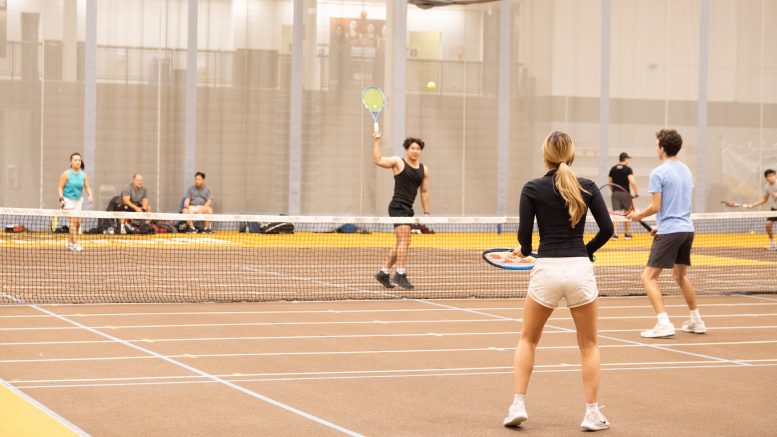The U of M Tennis Club athlete Magnus Gnilo shared insights into his tennis journey, highlighting how the sport has allowed him to connect with people.
Gnilo expressed optimism about the future of the tennis club.
The Manitoban: What makes playing tennis so special to you?
Gnilo: It’s always been special to me because it’s been introduced to me by my dad. My whole family plays tennis, so I come from a family of tennis players. I think what’s nice about it is I get to meet a lot of people. Tennis is a sport you can play for all ages. So, I get to meet a variety of people, not just people my age. And that makes it really fun and interesting for me.
M: There are other sports. There is football, there is volleyball, but you chose to play tennis. Any reason behind that?
G: Well, honestly, as a kid, I grew up playing basketball, played a little bit of soccer too. My dad tried to introduce me to baseball, but I want to say I’ve always been the best at tennis. And it’s just something that I’ve liked more ever since I was a kid. So, you know, as I grew up, I leaned more and more into it especially when I started playing competitively, I decided to drop everything and only play tennis.
M: If you want to be a competitive tennis player, what is required of you as a player?
G: It takes a lot of time and effort, obviously, just like any other sport. But really, I think since tennis is a technical sport, it’s really hard to improve without a nice coach. I’m grateful enough that my father was my coach. So I had a 24/7 coach, right? He helped me on and off the court. And that’s the commitment I think that makes a tennis player really good, especially from when they’re just starting.
M: Psychologically, does playing tennis require that you focus and concentrate all the time?
G: A hundred percent, yeah. It’s a very technical and physical sport, it requires both physical and mental strength, especially the higher you go, the more the mental strength plays a role. All the best tennis players, top 10, top 100 in the world all have very great mental game. It’s a requirement.
M: Let’s look at the Edmonton tournament. You guys went to Edmonton. It was such a great and wonderful performance, you guys did well. How did you guys manage to do that?
G: It’s a team effort, obviously, like aside from the training we do here. All the sessions we do here, we have an on-court training here. We do an off-court mental training session, led by Craig. Other than that, we’re all individual. Individually, we’ve been playing tennis since we were young. I know everyone in the team. We’re all just competitive tennis players from when we were juniors. And so really, it just stems from we’ve been working hard since we were younger and all that stuff too.
M: When it comes to playing doubles, how are you guys able to come out with team bonding on the court?
G: Personally, I play with one of my best friends. It’s really easy for me to have that chemistry. I’ve known him for a long time now. I’ve played so much with him. But I think we just have a lot of chemistry just because we play with each other so much. We’re a small team and it’s a small tennis community, just in general in Manitoba. Everyone here plays with each other a lot. We’re very familiar with each other’s game styles, personalities, just as a person. And it just really helps us on court that we know each other so well.
M: What would you say about the way forward for University of Manitoba Tennis Club?
G: It’s going in a really great direction. We’re like a newer sport here, a newer team. And I think for the amount of time we’ve had at the University of Manitoba, I think we’re doing phenomenal. Like the amount of players we have, our competitive team is doing really good. I think it’s going in the right direction. I like it. I’m excited.





